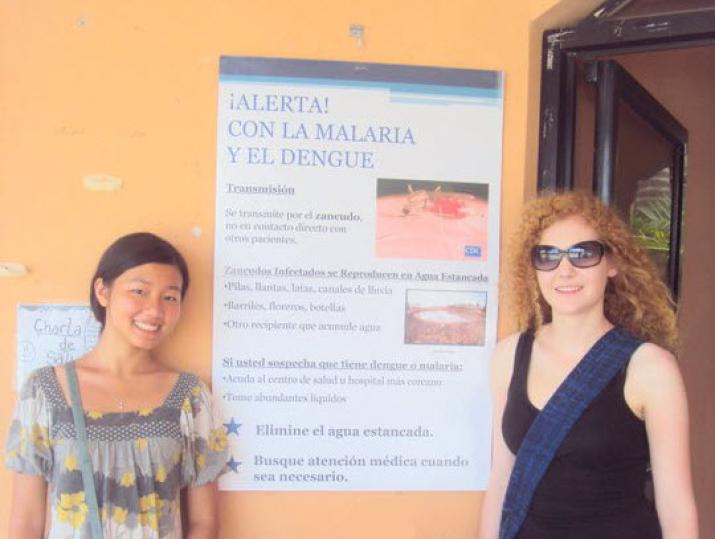
Duke alumnae Jianing Xie (left) and Leah Mische stand in front of a dengue awareness poster they made, along with fellow alumna and volunteer Altelisha Taylor (not pictured), while volunteering with Project HEAL. They received permission from the mayor to hang the poster at the entrance of the municipality building.
Published April 5, 2016, last updated on April 19, 2016 under Alumni Stories
Leah Mische, who graduated from Duke in 2013 with a neuroscience major, Spanish minor and global health certificate, has continued to engage in global health work while managing her staggering workload as a medical student at Johns Hopkins School of Medicine.
She’s working on a clinical research project in Peru, which brought her to the city of Puno on the shores of Lake Titicaca in the summer of 2015. The research measured the effect of chronic high altitude on community health by documenting heart rate variability among community members.
Special Teacher Inspired Mische’s Passion for Global Health
Growing up in Centennial, Colorado, Mische did not always envision herself in a global health career. “I grew up in a community that was seriously lacking in diversity, but I was lucky to have an inspirational high school Spanish teacher who opened my eyes to global inequalities and the role that the United States might play either intentionally or unintentionally in fueling them,” said Mische. “When I started to apply for colleges, I sought out the programs that would expose me to significant diversity of thought. I knew I would find that at DGHI and with the DukeEngage program.”
Mische Worked to Build Local Capacity in Honduras
At DGHI, Mische embraced opportunities that changed her world view. She began working with School of Medicine and global health professor Dennis Clements through the Duke student organization Project HEAL in her freshman year. Project HEAL implements service projects in Latin American communities with the goal of reducing global health disparities through education and empowerment.
During her years at Duke, she visited the same community in Honduras ten times. The longitudinal project aimed to develop and present health education materials to women and children about a variety of topics, from prevention of malaria or dengue fever to health during pregnancy.
After each subsequent visit to Honduras, Mische felt more determined to shift ownership of the project to community members and leaders with an eye toward sustaining its impact. “Along with Dr. Clements, my peers and I worked diligently to develop a program that was more about capacity building and less about a short-term volunteer health project,” she said. “By the time I left from my final trip, we were training midwives to present information about reproductive health to young women.”
Mische Foresees Training Medical Providers as her Global Health Niche
Mische also plans to pursue a master’s degree in public or international health while she’s in medical school. She hopes that conducting her own global health research project will teach her about the logistics of international research and equip her with the practical knowledge she needs to train other healthcare providers about working abroad.
Mische would like to spend her fourth year of medical school on an international rotation to learn from health professionals across different parts of the world. “Right now, I imagine that my work in global health will be centered on medical education, both for providers who want to volunteer their time abroad, as well as for helping to support the training of medical professionals who are from lower resource settings,” she reflected. “However, my understanding of what is needed in global health and what role I have to play in it continues to evolve.”


